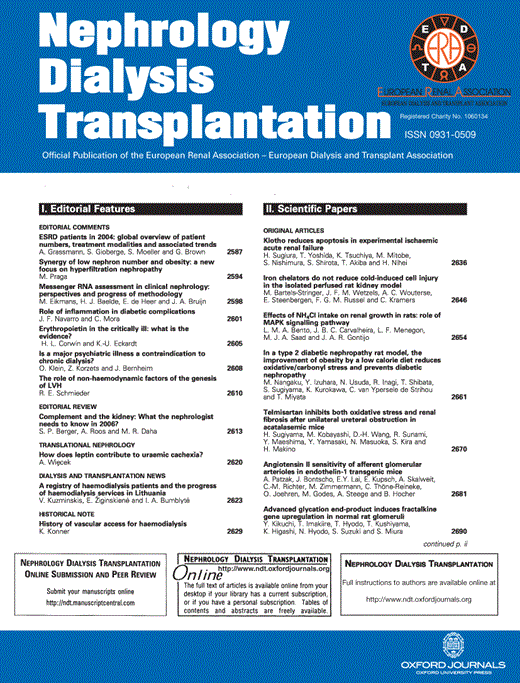-
PDF
- Split View
-
Views
-
Cite
Cite
Katia Boven, John Knight, Fred Bader, Jérome Rossert, Kai-Uwe Eckardt, Nicole Casadevall, Epoetin-associated pure red cell aplasia in patients with chronic kidney disease: solving the mystery, Nephrology Dialysis Transplantation, Volume 20, Issue suppl_3, May 2005, Pages iii33–iii40, https://doi.org/10.1093/ndt/gfh1072
Close - Share Icon Share
Abstract
A substantial increase in the incidence of pure red cell aplasia (PRCA) associated with recombinant human erythropoietin (epoetin) treatment occurred in 1998. The upsurge of antibody-mediated PRCA was almost exclusively associated with chronic kidney disease patients who received subcutaneous epoetin therapy and the formulation of epoetin-α distributed outside the USA (EPREX®/ERYPO®). A systematic programme of technical, immunological and epidemiological investigations was initiated to identify the possible causes. The potential causes were evaluated on the basis of the following criteria: temporal correlation with the increase in incidence of PRCA, significant difference between EPREX®/ERYPO® and other epoetin products, sufficient concentration in the product to elicit a weak immune response, evidence of immunogenic activity in animals supportive, and consistent with available clinical data. Organic compounds that were leached from rubber stoppers through the action of polysorbate 80 were detected in pre-filled syringes with uncoated rubber stoppers containing polysorbate 80-formulated EPREX®/ERYPO® (introduced outside the USA in 1998). The leachates were not present when the stoppers were coated, in the product formulated with human serum albumin or in other epoetin products. The adjuvant activity of the leachates was demonstrated in mice. The incidence of PRCA was significantly higher in patients exposed to the polysorbate 80 formulation of epoetin-α delivered from pre-filled syringes with uncoated rubber stoppers, which were recalled in 2003, than in patients exposed to the same formulation from syringes with coated rubber stoppers. In conclusion, these data strongly suggest that leachates were the critical contributory factor in the increased incidence of antibody-mediated PRCA attributed to EPREX®/ERYPO®.
Author notes
1Pharmaceutical Research and Development, Johnson & Johnson, Raritan, NJ, USA, 2Department of Nephrology, Georges Pompidou European Hospital, Paris, France, 3Department of Nephrology and Hypertension, University of Erlangen-Nuremberg, Erlangen, Germany and 4Service d'Hématologie Biologique, Hôpital Hôtel-Dieu, Paris, INSERM U362, Institut Gustave Roussy, Villejuif, France





Comments